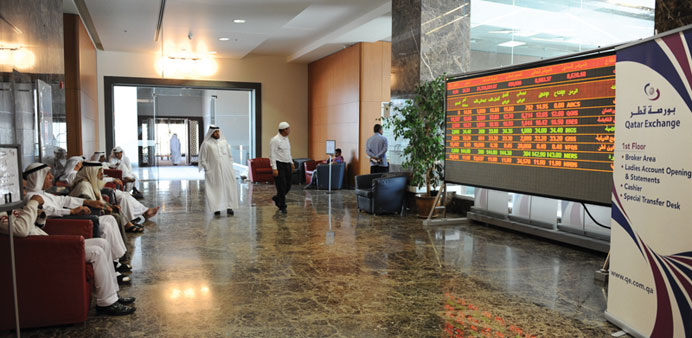By Santhosh V. Perumal/Business Reporter
Substantial selling in the large and mid cap stocks led Qatar Stock Exchange (QSE) on a slippery path to lose 72 points and settle below the 12,500 mark, despite optimism in the global energy market during the week.
Profit booking pressure was seen intense in the consumer goods, industrials, telecom, insurance, transport and banking stocks as the 20-stock Qatar Index fell 0.58% during the week that saw QNB, Qatar's largest lender by assets, outline its expansion in the South East Asia in view of the growing ‘East-West’ trade between Qatar and Asia.
In comparison, Bahrain and Kuwait bourses fell 0.88% and 0.39% respectively; even as Dubai gained 1.13%, Abu Dhabi (0.45%), Saudi Arabia (0.38%) and Muscat (0.34%) during the week that witnessed Qatar Central Securities Depository made certain amendments to allow foreign shareholders hold up to 49% in Commercial Bank of Qatar, the country's largest private sector lender by assets.
The market opened the week on a stronger note to touch a high of 12,540 points but only to see selling pressure for the next two days to take the index to a low of 12,457 points. Thereafter, the market was once again influenced by stronger buying interests but only to see profit booking on the last day and thus the index settled at 12,443 points.
Oil prices were reportedly rising towards $66 a barrel on expectation of easing of global supply glut in view of risks emanating from fighting in Iraq.
Qatari bourse has so far (year-to-date) reported 1.28% gains against Saudi Arabia’s 17.22%, Dubai’s 9.13%, Abu Dhabi’s 2.69% and Muscat’s 0.63%; while Bahrain and Kuwait plunged 3.29% and 3.11% respectively.
The overall bearish path came as net buying by foreign institutions weakened during the week that saw al khaliji, along with National Bank of Fujairah, successfully close a landmark 750mn Emirati dirham transaction for Pacific Controls, an international ICT player.
However, net selling by local retail investors and institutions as well as non-Qatari individual investors weakened during the week that featured Qatar's telecom major Ooredoo sign a $500mn revolving credit facility agreement with 10 lenders across the globe.
The index that tracks Shariah-principled stocks was, however, seen gaining, albeit at lower levels, compared with declines in the other indices in the market during the week that saw QIIB sign a new Al Dhameen programme portfolio agreement with Qatar Development Bank, enabling further expansion of small and medium enterprises financing in the country.
The 20-stock Total Return Index fell 0.58% and All Share Index (comprising wider constituents) by 0.49%; while Al Rayan Islamic Index was up 0.05% during the week that saw more than 58% of the companies in the red.
Consumer goods stocks shrank 1.55%, industrials (1.19%), telecom (1.07%), insurance (1.03%), transport (0.81%) and banks and financial services (0.78%); whereas real estate gained 1.95% during the week that saw telecom and realty segments witness considerable expansion in volumes.
Of the 43 stocks, only 16 gained, while 25 declined and two were unchanged during the week that saw trading volume was largely skewed towards real estate and banking shares.
Seven of the 12 banks and financial services, six each of the eight consumer goods and the nine industrials, three of the five insurers, two of the three transport and one of the two telecom sector equities close lower during the week.
Major losers included QNB, Industries Qatar, Gulf International Services, Aamal Company, Mesaieed Petrochemical Holding, Ooredoo, Milaha, Nakilat, Qatar Islamic Bank, Commercial Bank, Masraf Al Rayan, Salam International Investment and Qatar Insurance.
However, Islamic Holding Group, Qatari German Company for Medical Devices, Doha Insurance, al khaliji, Ezdan, Doha bank, Vodafone Qatar and Alijarah Holding were seen bucking the trend during the week.
Market capitalisation eroded 0.62% or more than QR4bn to QR661.97bn mainly on large and mid cap equities, which melted 1.33% and 0.63%; whereas small and micro caps reported 1.21% and 0.63% gains respectively during the week that witnessed Ezdan and Masraf Al Rayan stocks dominate the trading ring in terms of both volume and value.
Small, micro mid cap stocks have gained 11.33%, 8.65% and 5.44% respectively year-to-date; whereas large cap lost 7.17%.
Foreign institutions’ net buying weakened to QR300.06mn compared to QR365.06mn the previous week.
Local retail investors’ net profit booking fell to QR192.13mn against QR200.64mn the week ended May 14.
Domestic institutions’ net selling declined to QR84.51mn compared to QR137.75mn the previous week.
Non-Qatari retail investors’ net selling fell to QR23.42mn against QR26.68mn the week ended May 14.
Total trade volume rose 29% to 98.28mn shares, value by 16% to QR3.17bn and transactions by 17% to 36,032 during the week.
There was 83% surge in the telecom sector’s trade volume to 8.37mn equities, 71% in value to QR183.59mn and 2% in deals to 2,701.
The real estate sector’s trade volume soared 62% to 59.99mn stocks, value by 59% to QR1.41bn and transactions by 72% to 14,560.
The market witnessed 33% expansion in the consumer goods sector’s trade volume to 7.53mn shares but on 1% fall in value to QR179.75mn, while there was 11% rise in deals to 3,369.
The industrials sector’s trade volume was up 1% to 6.81mn equities, value by 22% to QR458.77mn and transactions by 14% to 6,563.
However, the banks and financial services sector reported 31% plunge in trade volume to 12.36mn stocks, 20% in value to QR692.36mn and 22% in deals to 6,829.
The insurance sector’s trade volume plummeted 20% to 2.27mn shares, value by 22% to QR191.66mn and transactions by 16% to 1,180.
The market witnessed 18% shrinkage in the transport sector’s trade volume to 0.94mn equities, 18% in value to QR45.53mn and 3% in deals to 830.
In the debt market, there was no trading of treasury bills and government bonds during the week.

